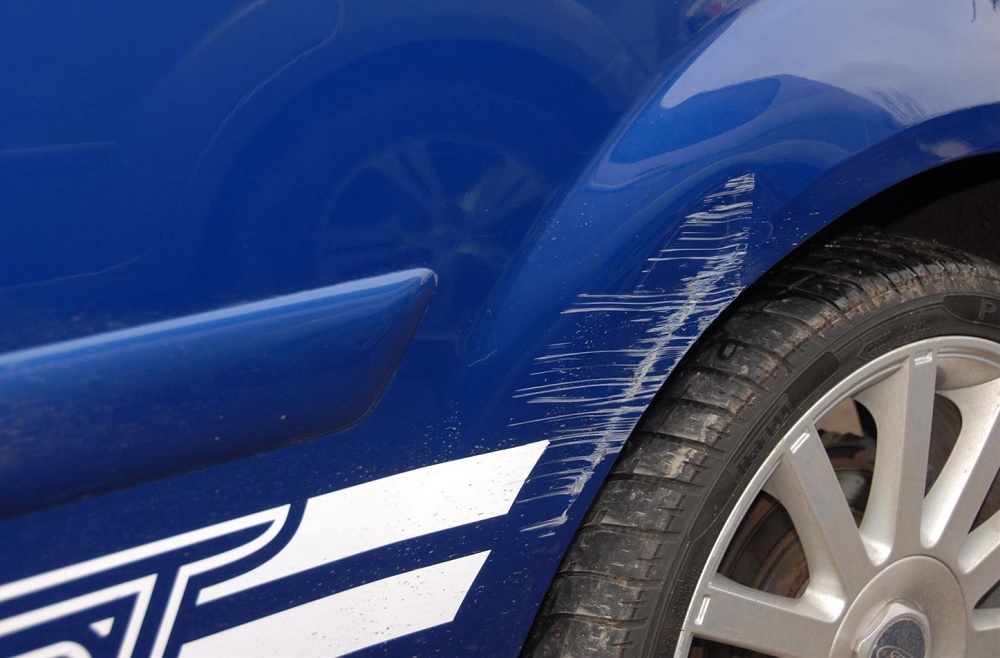Driving down the street, a sudden pang of dismay hits you as you notice a scratch on your car’s pristine surface. It’s a scenario many car owners can relate to, and the natural follow-up question is, “How much does fixing a scratch on a car cost?” This comprehensive guide aims to demystify the intricacies of car scratch repair costs, providing insights into the factors that influence expenses and offering practical solutions for both budget-conscious and quality-seeking individuals.
Table of Contents
- Understanding the Basics of Car Scratch Repair
- Factors Influencing Car Scratch Repair Costs
- Estimating Costs and Budget-Friendly Solutions
- Budgeting Tips and Tricks
- The Cost-Effectiveness of Preventive Measures
- Expert Tips for Managing Car Scratch Repair Costs
- 1. Prompt Attention Matters
- 2. Regular Maintenance Goes a Long Way
- 3. Explore DIY Options for Minor Scratches
- 4. Evaluate Insurance Coverage
- 5. Build a Relationship with a Trusted Local Shop
- 6. Consider Preventive Measures
- 7. Explore Paintless Dent Repair for Dings
- 8. Negotiate with Repair Shops
- 9. Get Multiple Quotes
- 10. Document the Damage for Future Reference
- Frequently Asked Questions About Car Scratch Repair Costs
- 1. What factors influence the cost of fixing a scratch on a car?
- 2. Can I use a DIY kit to repair a deep scratch on my car?
- 3. Does insurance cover the cost of fixing cosmetic damage like scratches?
- 4. How can I prevent scratches on my car in the first place?
- 5. Is it worth negotiating with auto repair shops for scratch repairs?
- 6. What should I look for when obtaining quotes from repair shops?
- 7. Are there any hidden costs associated with car scratch repairs?
- 8. Can I repair a scratch on my car’s surface without repainting the entire panel?
- 9. How long does it take to fix a scratch on a car?
- 10. Is it necessary to fix a small scratch immediately?
- Choosing Quality Over Affordability
Understanding the Basics of Car Scratch Repair
1. Scratch Severity Levels
Scratch severity ranges from superficial surface marks to deep gouges. Superficial scratches may only require a simple touch-up, while deeper ones could involve more extensive repair work, impacting the overall cost.
2. Type of Paint
The choice of paint on your vehicle significantly influences repair costs. Tri-coat and metallic paints are known to be more expensive to fix due to their intricate application processes and the need for specialized materials.
3. Vehicle Make and Model
The make and model of your car play a pivotal role in determining repair costs. Luxury cars or those with unique paint finishes might incur higher expenses, as replicating specialized paint can be a challenging task.
Factors Influencing Car Scratch Repair Costs
4. DIY vs. Professional Repair
Choosing between a do-it-yourself approach and professional services is a crucial decision. DIY kits are cost-effective but may not provide the same quality finish as professional repairs, which come at a higher cost.
5. Paint Material and Quality
The quality of the paint used on your vehicle affects repair costs. High-quality paints, while enhancing the overall look of the car, can be more expensive to repair.
6. Location and Size of the Scratch
The location and size of the scratch impact repair costs. Small, localized scratches might be less expensive to fix, while extensive damage covering a larger area could drive up costs.
7. Additional Repairs
Sometimes, scratches come with additional damage, such as dents or dings. Repairing these issues simultaneously can affect the overall cost, making it essential to assess the full extent of the damage.
Estimating Costs and Budget-Friendly Solutions
8. Obtaining Multiple Quotes
Gathering quotes from various auto shops is a smart strategy. This not only helps in estimating the average cost but also allows you to choose a service that fits your budget.
9. Insurance Coverage
Reviewing your insurance policy for coverage on cosmetic damage is a prudent step. Some policies may contribute to offsetting a portion of the repair costs, easing the financial burden.
10. DIY Repair Kits
For minor scratches, consider using DIY repair kits available in the market. These kits are not only cost-effective but also offer the convenience of addressing minor issues at your own pace.
Budgeting Tips and Tricks
11. Negotiating with Repair Shops
Negotiating with auto repair shops is a skill worth developing. Many shops are open to discussions, especially if you’re a loyal customer or bringing in multiple repairs. (See Also: How Much Does It Cost to Buff a Car? Your Ultimate Guide to Car Buffing Expenses)
12. Exploring Local Repair Options
Local, independent auto repair shops may provide more affordable services compared to larger franchises. Building a relationship with a trusted local shop can lead to cost savings over time.
The Cost-Effectiveness of Preventive Measures
13. Investing in Paint Protection Films
Prevention is often more cost-effective than cure. Consider investing in paint protection films that act as a barrier against scratches, reducing the likelihood of damage in the first place.
14. Regular Car Maintenance
Routine maintenance, including washing and waxing your car, contributes to preserving the paint and reducing the likelihood of scratches. A well-maintained car not only looks better but also retains its value over time.
Expert Tips for Managing Car Scratch Repair Costs
As a car owner, dealing with scratches on your beloved vehicle can be a daunting experience. However, fear not! Here are some expert tips to help you navigate the world of car scratch repairs and manage costs effectively.
1. Prompt Attention Matters
Addressing scratches promptly is key to preventing further damage. Small scratches can escalate if left unattended, leading to more extensive and costly repairs.
2. Regular Maintenance Goes a Long Way
Engage in routine car maintenance practices such as washing and waxing. This not only keeps your car looking its best but also serves as a protective barrier against potential scratches.
3. Explore DIY Options for Minor Scratches
For minor scratches, consider DIY repair kits. They are cost-effective and can be an excellent solution for small-scale damage, providing a satisfying finish without burning a hole in your pocket.
4. Evaluate Insurance Coverage
Review your insurance policy to understand the coverage for cosmetic damage. In some cases, insurance might contribute to the repair costs, easing the financial burden on your end.
5. Build a Relationship with a Trusted Local Shop
Establishing a rapport with a local, independent auto repair shop can lead to more reasonable costs for both immediate repairs and future maintenance. Local businesses often value customer relationships.
6. Consider Preventive Measures
Investing in paint protection films is a proactive step. While it incurs an initial cost, the long-term benefits in preventing scratches make it a worthwhile investment.
7. Explore Paintless Dent Repair for Dings
If your scratch comes with dings or dents, explore the option of paintless dent repair. This method is often more cost-effective than traditional dent repair, saving you money in the process. (See Also: Are Chemical Guys Products Any Good? Unveiling the Truth Behind the Hype)
8. Negotiate with Repair Shops
Don’t shy away from negotiating with auto repair shops. Many establishments are open to discussions, and you might secure a more favorable deal by being proactive.
9. Get Multiple Quotes
Obtain quotes from several auto shops before making a decision. This not only helps in understanding the average cost but also gives you the power to choose the most cost-effective option.
10. Document the Damage for Future Reference
Before initiating any repairs, document the scratch with photographs. This documentation can serve as evidence in case of disputes and ensures transparency in the repair process.
Remember, managing car scratch repair costs is not just about finding the cheapest solution but about striking the right balance between affordability and quality. By incorporating these expert tips into your approach, you can navigate the process with confidence and make informed decisions that benefit both your car and your wallet.
Frequently Asked Questions About Car Scratch Repair Costs
Navigating the world of car scratch repairs can be confusing, and many questions may arise. Here are some frequently asked questions and comprehensive answers to help you understand the ins and outs of car scratch repair costs.
1. What factors influence the cost of fixing a scratch on a car?
Several factors impact repair costs, including the severity of the scratch, type of paint, make and model of the vehicle, and the choice between DIY and professional repairs.
2. Can I use a DIY kit to repair a deep scratch on my car?
DIY kits are ideal for minor scratches. However, for deep scratches, especially those reaching the primer or metal, professional assistance is recommended for a seamless and lasting repair.
3. Does insurance cover the cost of fixing cosmetic damage like scratches?
Insurance coverage varies, but some policies do cover cosmetic damage repair costs. Review your policy details or consult with your insurance provider to determine the extent of coverage.
4. How can I prevent scratches on my car in the first place?
Regular maintenance, such as washing and waxing your car, helps create a protective barrier. Additionally, investing in paint protection films can significantly reduce the risk of scratches.
5. Is it worth negotiating with auto repair shops for scratch repairs?
Absolutely. Many auto repair shops are open to negotiation, especially if you are a loyal customer or getting multiple repairs done simultaneously. Don’t hesitate to discuss costs and explore potential discounts. (See Also: What Do the Different Color Polishing Pads Mean? A Comprehensive Guide)
6. What should I look for when obtaining quotes from repair shops?
When getting quotes, consider the reputation of the repair shop, the type of materials they use, and customer reviews. Look for a balance between quality and affordability to ensure a satisfactory repair.
While reputable repair shops are transparent about costs, it’s essential to inquire about any potential hidden fees. Ask for a detailed breakdown of the estimate to avoid surprises.
8. Can I repair a scratch on my car’s surface without repainting the entire panel?
In many cases, yes. Minor surface scratches can often be addressed without repainting the entire panel. Professional technicians use techniques like spot blending to achieve a seamless finish.
9. How long does it take to fix a scratch on a car?
The repair time depends on the severity of the scratch and the chosen repair method. DIY solutions may take a few hours, while professional repairs might require leaving the car at the shop for a day or more.
10. Is it necessary to fix a small scratch immediately?
While small scratches may not require immediate attention, addressing them promptly is advisable to prevent further damage. Small scratches can escalate over time, leading to more extensive and expensive repairs.
Understanding these frequently asked questions will empower you to make informed decisions when it comes to addressing scratches on your car. Whether you opt for a DIY solution or seek professional assistance, being well-informed ensures a smoother process and satisfactory results.
Choosing Quality Over Affordability
In conclusion, the question of how much fixing a scratch on a car costs involves a delicate balance between quality and affordability. Whether you opt for a DIY solution or seek professional help, understanding the trade-offs is essential. By exploring your options, obtaining multiple quotes, and staying informed, you can make a decision that aligns with both your budget and your car’s aesthetic needs.
Remember, addressing those scratches promptly not only enhances the visual appeal of your car but also contributes to its long-term value. So, take a thoughtful approach, weigh your options, and enjoy the satisfaction of driving a car that looks as good as new, without breaking the bank.



